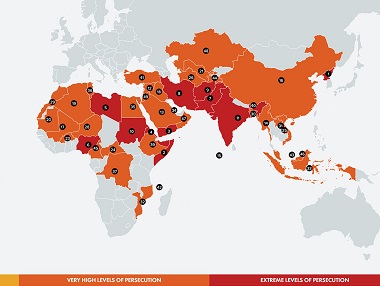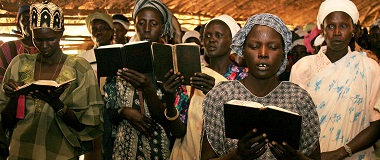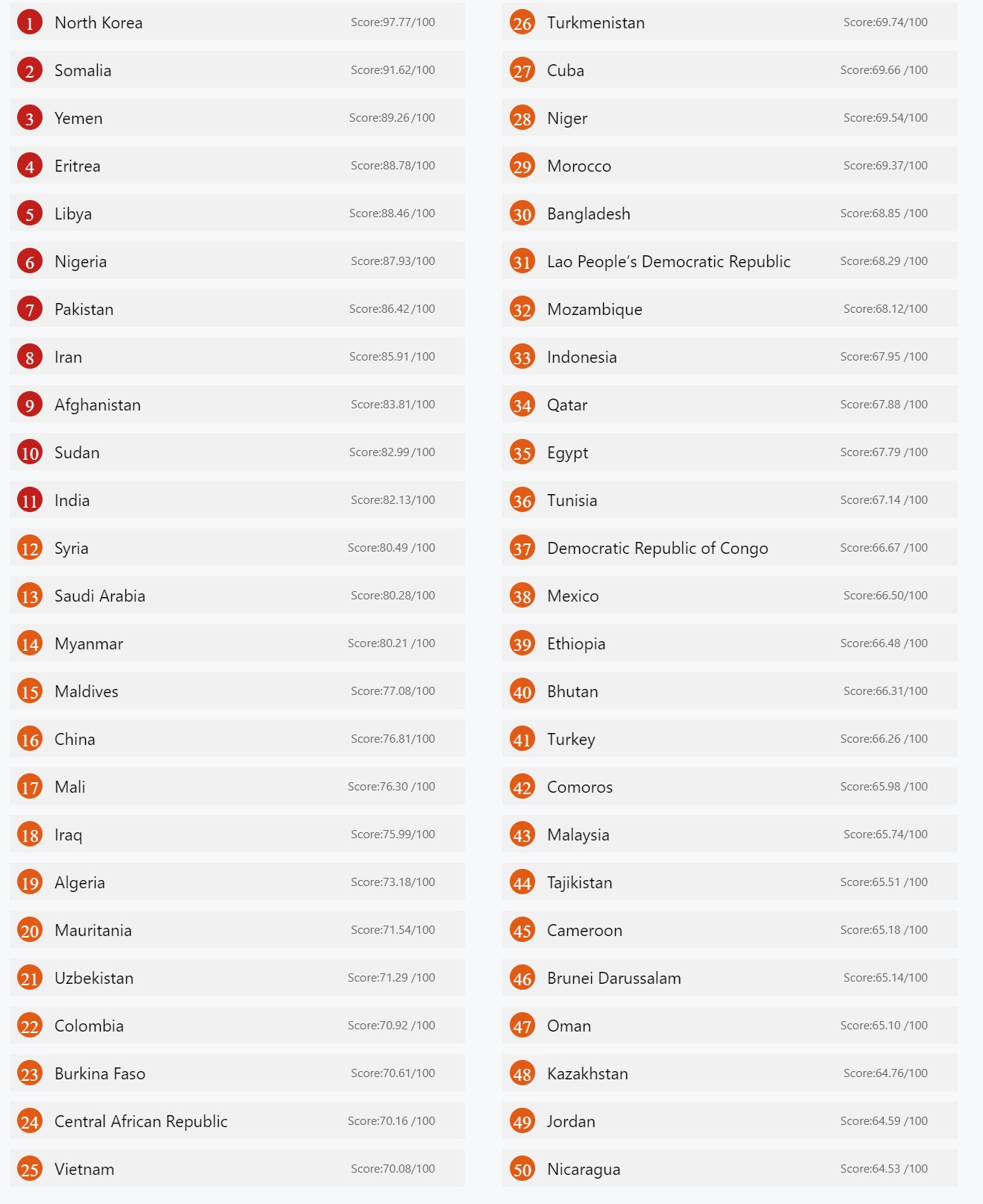
A map of the 2023 World Watch List by Open Doors. Screen grab
For the past 30 years the religious liberty organization Open Doors has published its annual ranking of the 50 countries where Christians face the most extreme persecution.
The 2023 World Watch List released January 17 includes several key findings:
- Persecution of Christian has never been worse during the time Open Doors has been monitoring the situation.
- In Open Doors’ World Watch List top 50 alone, 312 million Christians face very high or extreme levels; more than 360 million worldwide.
- More than 124,000 Christians were forcibly displaced from their homes because of their faith.
- Some 15,000 became refugees.
- More than 5,600 were killed for their faith
- More than 2,100 churches were attacked or closed.
- North Korea has returned to top spot, after having been replaced by Afghanistan last year.
- Many Sub-Saharan African nations are suffering from increased Islamic extremism and violence.
An article in Christianity Today provides a good overview of findings from the World Watch List, including this useful insight:
Martyrdoms dropped by more than 275 from the prior year, as Open Doors tallied 5,621 Christians killed for their faith during the reporting period. Representing a decrease of five percent, the toll remains the second highest since the 2016 record of 7,106 deaths. Nigeria accounted for 89 percent of the total.
Open Doors is known for favouring a more conservative estimate than other advocacy groups, which often tally martyrdoms at 100,000 a year.
The International Institute for Religious Freedom (IIRF) – which is affiliated with the World Evangelical Alliance (WEA) – endorsed the 2023 version of the World Watch List (WWL) in a January 23 statement:
Each year the IIRF conducts a formal audit of the WWL, due to the enormous significance for religious freedom advocacy of demonstrating that the reports on persecution of religious believers are accurate.
“The WWL is very important as it provides reliable data,” said Janet Epp Buckingham, the WEA’s Director of Global Advocacy and editor of the IIRF’s International Journal of Religions Freedom. “The IIRF audit ensures that it is trustworthy. The annual release of the WWL is much anticipated by advocates for religious freedom as well as policymakers in countries around the world.”
Go here for the full statement. Buckingham is co-director of the North American affiliate of the International Institute for Religious Freedom, which is based in Vancouver. (I have written about her work with the IIRF here and here.)
Following are some of the most notable findings and the key trends from the Open Doors 2023 World Watch List.
Most notable
 #1 North Korea
#1 North Korea
North Korea has returned to no. 1 with the highest levels of persecution ever seen. Its score of 98, an all-time high, reflects an increase in arrests of Christians, and house-churches discovered and closed – under the new ‘anti-reactionary thought law’.
#9 Afghanistan
Despite its drop in ranking, persecution remains extreme in Afghanistan. Fewer Afghan Christians were killed for their faith in 2022: many have fled or were killed when the Taliban took over. Christian converts who remain are in deep hiding – and would likely face death if discovered.
#6 Nigeria
Christians continue to be brutally attacked in Northern Nigeria. Boko Haram, ISWAP, Fulani militants and other armed bandits have conducted devastating raids on Christian communities. The government continues to deny this is religious persecution, so violations of Christians’ rights have been carried out with impunity.
5,621 Christians killed
5,621 Christians were killed for their faith last year. 90% of these were from Nigeria alone. The huge increase in violence in Nigeria and Sub-Saharan Africa has caused more Christians to lose their lives in the last 5 years. Christians killed in 2023 numbered 80% more than five years ago (3,066).
#16 China
In China, the use of digital surveillance technology is spreading, adding to persecution and intimidation. As digital tools became more sophisticated, so did the Chinese government. Beijing employed censorship, disinformation and unblinking surveillance to ratchet up control of religious groups.
#50 Nicaragua
Nicaragua has entered the top 50 for the first time. This reflects government repression which escalated since the April 2018 protests. The reputation of authority and legitimacy the Church has in the country has made it a particular target. Church buildings were damaged, TV stations and colleges closed, religious leaders expelled.
Go here for profiles of all 50 countries to find in-depth information about their situation, believers’ stories, and specific prayer requests.

Key trends
- Open Doors’ mission is to ensure that persecuted Christians do not suffer alone – but are connected to the worldwide church for support and encouragement.
Since 1993, the World Watch List has revealed the scale and severity of the persecution of Christians. In the last 30 years, the number of countries where Christians suffer high and extreme levels of persecution has almost doubled to 76 countries.
Today, more than 360m Christians suffer high levels of persecution and discrimination for their faith. In Open Doors’ World Watch List top 50 alone, 312m Christians face very high or extreme levels.
This overview of persecution trends gives some insight into the experience of Christians who follow Jesus no matter the cost.
- Violence against Christians in Sub-Saharan Africa has reached new heights.
Jihadists are destabilizing countries in West and Central Africa. Entire countries are at risk of collapse into extremist violence. 26 countries in Sub-Saharan Africa face high levels of persecution; half of these have violence scores in the “extremely high” range.
The jihadist movement, which seeks to expand Sharia across the continent, has forced Christians into constant motion, from their homes to displacement camps, or to other countries. The insecurity stemming from this experience of forced displacement makes Christians even more vulnerable to further violence. Christian women, in particular, can be easily targeted for sexual attack, while men are more likely to lose their lives.
- China’s model of oppression is spreading throughout authoritarian states.
The apparent success of China, especially in economic terms, is appealing to many leaders around the world. The promise of growth and prosperity, while being able to control all groups and individuals perceived as deviant, has triggered the interest of leaders from all over the world, no matter their ideological background.
Countries as diverse as Sri Lanka, Myanmar and Malaysia have headed down this same authoritarian path, joining Central Asian states like Azerbaijan, Kazakhstan, Kyrgyzstan, Tajikistan, Turkmenistan, Uzbekistan and Russia.
The mere existence of Christian communities is a thorn in the flesh of the regimes in many of these countries. Even more so if Christian activists raise their voice frustrating the regime’s attempts to control its citizens. Using the language of “stability” and “security”, autocrats put immense pressure on church leaders in response to their persistent call for the respect of human rights, free participation of civil society, the rule of law, and election transparency. Those who refuse to support the ruling party can be branded as “troublemakers”, “disturbers of the peace” or even “terrorists”. They face arrest, demolition of church buildings, and the loss of church registration.
- The church in the Middle East is reduced and still under pressure.
The church has not been able to recover after the upsurge of Islamic State and the attempts of extremists to wipe out Christianity entirely.
Discrimination and oppression coupled with crippling economic decline means the church is losing hope, particularly for young people.
In the Levant region of the Middle East (Lebanon, Syria, Iraq, Israel/Palestinian Territories and Jordan), the Christian community is shrinking due to deprivation, discrimination and persecution. Ever since the Islamic State group (IS) arrived on the scene, Christians in those areas of Iraq and Syria have been struggling to earn a living; young Christians in particular face high unemployment and continual hostility, thus encouraging their desire to emigrate. When Christian emigration increases, church communities are weakened as a consequence, deprived of the next generation of leaders and families, and so become easier targets for further marginalization.
Elsewhere in the region there has been less violence, fewer killings, but not a better outlook. Converts to Christianity from Islam continue to face high levels of pressure from family and community.
- Conditions for the church has worsened in Latin America.
On the 2022 list, three Latin American countries were ranked in the top 50. On the 2023 list, there are now four: Nicaragua is ranked No. 50 in 2023, the first time the country has appeared within the top 50. It joins Colombia (22), Cuba (27) and Mexico (38).
Corrupt and ineffective government has created space for criminal groups and ethnic leaders to emerge, strengthen and become drivers of persecution – especially in rural areas and among indigenous populations.
Government repression in Nicaragua, Cuba and Venezuela has intensified against those who are seen as opposition voices. In Nicaragua especially, communist repression of church leaders became increasingly visible during the year.
Go here for Open Doors Canada and here to download the World Watch List Prayer Guide.
